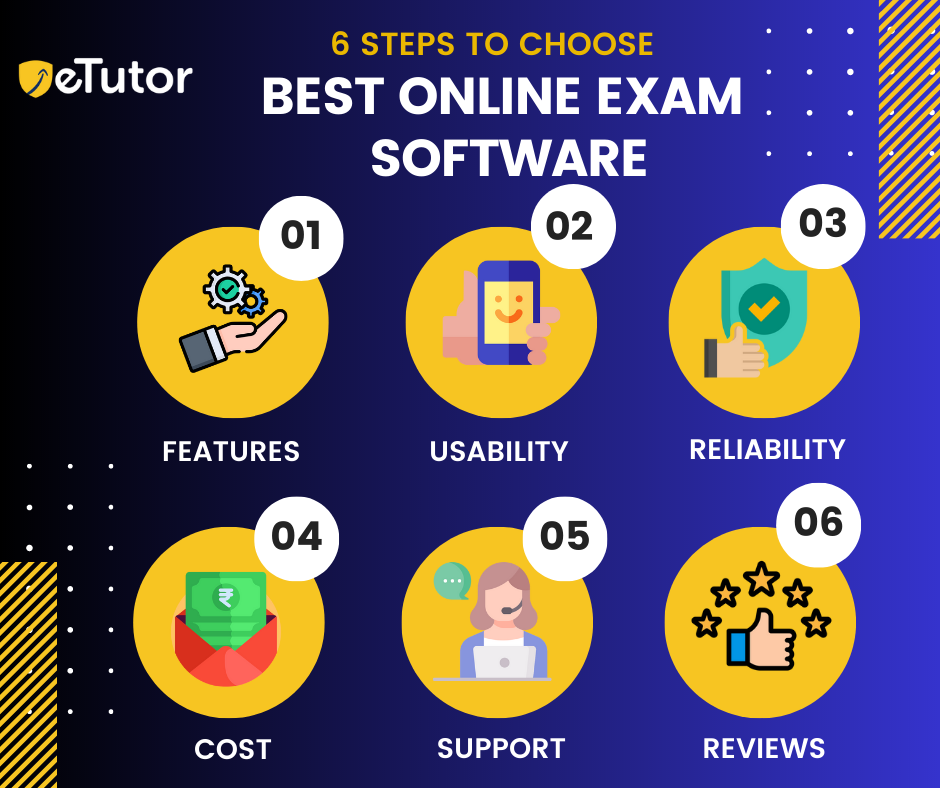Online Exam Software – Types, Features and Benefits

Table of contents
What is online exam software?
Types of online exams
Why choose online exams over traditional exams?
How does an online exam system work?
How to choose the best online exam software?
What are the features of online exam software?
What are the advantage and disadvantages of online exam software?
How Can An Online Examination System Help You Increase Operational Efficiency?
Online exam software benefits:
How did E-tutor Online exam software help?
What is online exam software?
Online exam software is a computerized web application that enables educational institutions, training centers, and organizations to administer and conduct exams online. It is designed to simplify the exam administration process and provide an efficient and secure way to conduct exams remotely.
Types of online exams:

Online exam software can administer many different kinds of online tests. These are a few typical examples:
Objective exams:Multiple-choice questions with a single correct response make up objective tests. These are made to gauge a candidate’s knowledge and fact-recall abilities.
Subjective Exams:Subjective examinations frequently have essay questions that demand the candidate to respond thoroughly to a query or offer a solution to a problem. These tests assess a candidate’s understanding and logical and critical thinking abilities.
Aptitude Tests:Aptitude tests evaluate a candidate’s capacity for learning, problem-solving, and rational thought. They might ask about abstract reasoning, verbal reasoning, or numerical reasoning.
Certification Exams:Candidates’ competence in a specific subject or skill is assessed through certification tests. To certify a candidate’s skills and expertise, professional associations or certification authorities frequently administer them.
Entrance examinations:Educational institutions utilize entrance exams to assess a candidate’s aptitude and likelihood of success in a particular degree or program exams like the SAT, ACT, GRE, and GMAT are examples.
Adaptive Exams:Exams that adjust their difficulty level based on the answers given by candidates are known as adaptive examinations. It guarantees that the exam fairly assesses the candidate’s level of expertise and knowledge.
The types of online tests that can be given utilizing online exam software are just a few examples. The exam’s objective, the amount of knowledge and abilities being examined, and the required precision and accuracy all influence the selection of the exam type.
Why choose online exams over traditional exams?

Online examinations may be preferred over traditional exams for several reasons:
Convenience: Online tests allow you to take the test anytime and from any location. It saves time and money by removing the need for learners to visit a testing facility physically.
Flexibility:The types of questions that can be asked and the exam structure are more flexible with online exams. Additionally, they can be adjusted to the degree of proficiency of each student, making the assessment process more individualized.
Less Paperwork:Using online exams instead of paper exams saves money and the environment by eliminating the requirement to print, distribute, and store paper exams.
Faster Grading:Automatic grading of online tests can save professors’ and students’ time. It is beneficial for big classes where evaluation could take a while.
Improved Security: To lessen the chance of fraud, online exams could be created using built-in security measures, including password protection, randomly ordered questions, and time restrictions.
Ultimately, online tests provide students and teachers with a more practical, adaptable, and effective testing experience.
TIP: TRY eTutor
Revolutionize Your Exams with Etutor Online Exam Software.Create & Conduct any Online Tests in Minute & Manage Examination with Responsive Panel.
How does an online exam system work?

Online tests are frequently administered utilizing specific software or platforms that let students view the test remotely through the internet. The fundamental steps are as follows:
Setup: Using the online testing software, the instructors or testing administrator sets up the exam by producing a test or quiz. Users can specify any other parameters or regulations, the questions they want to include, and the time limit.
Access:The instructor will issue a particular link or login information that students can use to access the online exam.
Taking the Examination:Students use online testing software to complete the exam, which asks them questions and lets them enter their responses. The software may include several question types, including multiple-choice, true/false, short answer, and essay questions.
Exam submission: After finishing the test, the student submits it using the online testing platform. While some software might let students save their work and return to the exam later, other programmes would demand that they do it all at once.
Grading:The online testing programme automatically grades the exam and can give students immediate feedback. Furthermore, the instructor can evaluate the exam manually based on the examination type and technology being utilized.
Overall, online tests offer teachers a dependable tool to evaluate students’ skills and comprehension while giving students a simple and efficient method of taking exams remotely.
How to choose the best online exam software?

It can be challenging to choose the best online exam software; however, the following essential elements should be taken into account:
Features:Search for software with the attributes you require, such as a selection of question formats, movable exam parameters, and reporting tools. Proctoring, anti-cheating precautions, and connectivity with some other resources like learning management systems were a few extra features that some applications might offer.
Usability:Educators and learners should find the programme simple to use and navigate.
Reliability: Check for software with a strong track record of uptime and performance and sufficient security safeguards to safeguard data.
Cost:Consider the software’s price and whether it is in line with your budget.
Support:Check for applications that offer helpful tutorials, documentation, and forums, as well as reasonable customer assistance.
Reviews:Seek out recent evaluations that offer thorough comments on the software’s advantages and disadvantages.
What are the features of online exam software?

Online exam software typically includes features such as:
Exam creation tools: this allows examiners to create and design exams, add questions, set question format, and manage time limits.
Question bank management: provides access to a library of questions, including various formats such as multiple-choice, short-answer, and essay-type questions.
Online test delivery: allows candidates to take exams online, providing an intuitive and user-friendly interface for taking the exam.
Automated grading:allows the system to grade exams automatically, freeing up the examiner’s time and reducing the chances of human error.
Reporting and analytics provide insights into student performance, exam results, and detailed reports.
Security features: includes anti-cheating measures, such as randomizing questions, detecting plagiarism, or setting a time limit to prevent students from cheating during the exam.
What are the advantage and disadvantages of online exam software?
Technology plays a significant role in delivering outstanding education to students. It is important to carefully evaluate the platform and weigh its advantages and disadvantages before using it
Now let’s explore the advantages and disadvantages that make online examination platforms a boon or a bane.
Advantages of Online Exam Software:
Convenience: Thanks to online exam software, students can take examinations from any location with an internet connection.
Grading: Online exam applications may automatically mark exams, minimizing instructors’ time and minimizing grading errors.
Cost savings: Printing and delivering paper tests are avoided with online exams, which can decrease material and delivery expenses.
Improved security: To help avoid cheating and safeguard the authenticity of the exam, online test software could provide additional security measures, including proctoring and anti-cheating technologies.
Analytics & reporting: Online exam software could give teachers analytics and reporting features to assist them in spotting students’ weak points and keeping tabs on their progress.
Disadvantages of online examination platform
Here are some of the main disadvantages of online examination platforms:
Limited flexibility: Unlike traditional paper-based exams, which permit students to make notes or scribble in the margins, online exams may not be as flexible.
Inadequate preparation: Students might not be sufficiently prepared for online exams and could require further instruction on the platform or technology.
Lack of Control: Teachers could have less control over the testing environment during online exams. For instance, they might be unable to closely watch pupils stop cheating or ensure they abide by the regulations.
Limited Interaction: Online tests may restrict student-teacher interaction, making it more challenging for teachers to offer support and direction during the exam.
Access and Equity: During online exams, students who may not have access to dependable internet connections, equipment, or quiet study areas may be at a disadvantage. The digital divide between students from different socioeconomic backgrounds may worsen existing disparities.
Limited Test Formats: Not all tests, such as practical lab exams or tests requiring tangible materials or equipment, can be replicated via online exams.
Technical problems: Online tests rely on technology, they may experience connectivity troubles, software bugs, or server breakdowns.
Cheating: Online exam software can offer sophisticated security protections, yet some students may still find ways to cheat despite these measures.
Issues with ease of access: Not all students, particularly those with impairments or those without regular internet access or technologies, can take online tests.
How Can An Online Examination System Help You Increase Operational Efficiency?
An online examination system can help increase operational efficiency by streamlining exam administration, reducing costs, minimizing administrative burden, improving accuracy, enhancing security, and increasing scalability.
By switching to an online exam system, educational institutions can gain several benefits that enhance student learning.
Some essential elements that operational efficiency are:
Automated scheduling and planning of exams:
Online examination systems can automate exam scheduling and management, allowing teachers to plan exams conveniently, control exam hours and lengths, and ensure students access relevant materials and resources.
Customization of online exams:
With online testing platforms, teachers can alter exam parameters, including question types, levels of difficulty, and time limitations, to better meet the needs of their students and the subject matter being tested.
Question bank Management:
Online testing platforms simplify constructing and managing question banks, allowing educators to rapidly and easily create new tests from pre-existing questions or add further questions as needed.
Effective grading and result analysis:
Online examination systems can automatically grade multiple-choice and true/false questions, enabling quicker and more accurate grading. The system can also offer thorough reporting and analytics on exam results, allowing the teachers to spot areas where students need more assistance quickly.
Improved accessibility:
Since online examination systems can be accessed from any location with an internet connection, it is now simpler for students and educators to construct and manage exams from anywhere. It makes it possible for students to take exams remotely or from home.
Reduced administrative burden:
Online examination systems automate many administrative tasks, including exam scheduling, registration, and reporting, reducing the administrative burden on staff. Our E-tutor online exam software is a technology driven platform that helping in conducting exams for hassle-free thereby simplifying the admin tasks.
Increased scalability:
Online examination systems can accommodate many exam takers simultaneously, allowing for more efficient use of time and resources. It makes it easier to scale up exam operations to meet the needs of a growing organization or to accommodate sudden spikes in demand.
Improved accuracy:
Online examination systems can provide more accurate and consistent grading and reporting than manual grading, reducing the risk of errors and inconsistencies.
Enhanced security:
Online examination systems provide more protection than paper-based exams, preventing cheating and ensuring that only authorized individuals can access exams and exam results.
Online exam software benefits:
Online exam software benefits include the following:
- Greater flexibility
- Cost-effective
- Enhanced security
- Time-Saving
- Improved accessibility
- Eco-friendly
- Advanced analytics and reporting
How did E-tutor Online exam software help?
Utilizing cutting-edge online proctoring technologies, the E-tutor online examination software assists in safely administering essential exams. The application also allows end users to control the entire online evaluation process. The whole procedure is intended to make it as easy for customers to conduct assessments, including online registration and exam production to center management and real-time reporting.
Our e-Tutor Online Exam Software comes with:
Candidate authentication: By integrating OTP, Aadhar/biometrics, along with ID authentication, the system completely removes any danger of impersonation. To prevent impersonation, this also uses face detection by snapping images of the applicants and their IDs.
AI Proctoring: It makes it possible to watch for questionable behaviour and behaviours of applicants. The newest developments in AI-based and remote live proctoring are combined in the Etutor online exam software proctoring technologies to remove the possibility of cheating altogether.
Safe Exam Browser: Candidates cannot access the internet while taking the Etutor online exam. Once activated, this function detects and terminates the test for test takers who open numerous browser tabs and navigate out from the examination window.
Online exam software has grown in popularity as a tool for instructors to administer exams and for students to take exams remotely as remote learning and technology in education both rise. When deciding to utilize online exam software, weighing the potential benefits and drawbacks is crucial as picking a program that adheres to your institution or organization’s particular needs and specifications.
Author: Saritha Reddy
Website: https://www.etutor.co
Recent Posts
- NTA-Based Hybrid Assessment Software for IIT-JEE Mains, Advanced & NEET
- eTutor Offline Exam Software for IIT-JEE, NEET, and Foundation with Student Performance Analytics
- NEET Test Generator for Academies & K-12 Schools
- How School ERP Software Maximizes Productivity and Minimizes Cost
- How Does ERP Software for Schools Help Educators?







